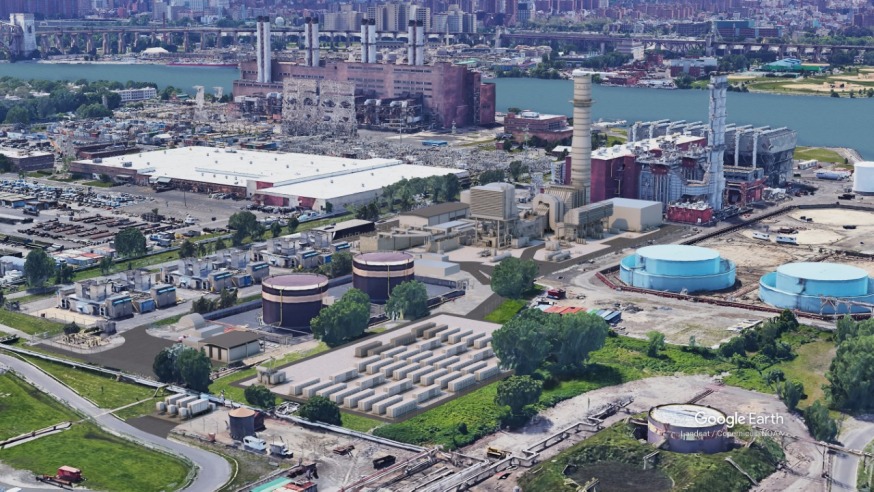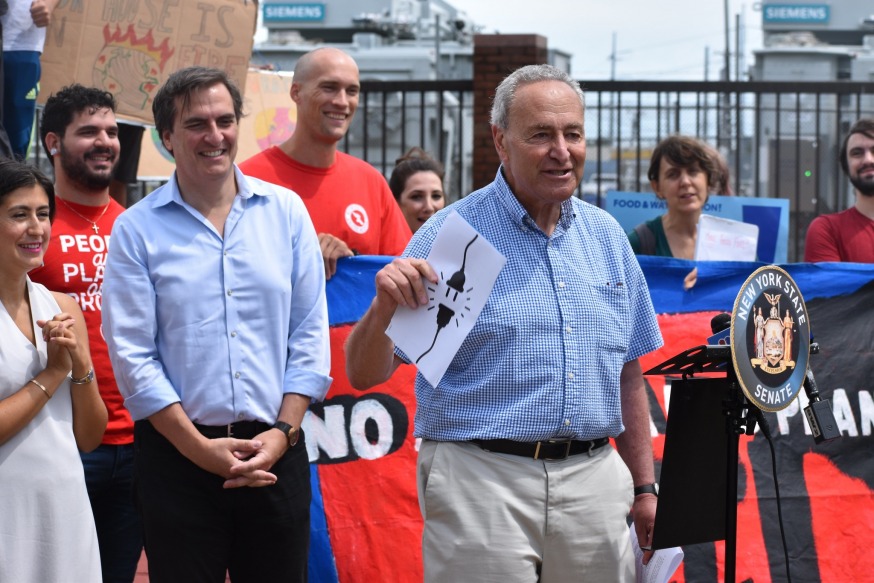
NRG’s proposed power plant (NRG)
Oct. 27, 2021 By Allie Griffin
The state has rejected a controversial proposal put forward by a Houston-based energy company to build a natural gas power plant in Astoria.
The New York State Department of Environmental Conservation denied permits sought by NRG Energy to revamp its 50-year-old Astoria Generating Station on 20th Avenue by replacing aging gas and oil-fired turbines with a natural gas-fired plant.
The plan, according to NRG, would have significantly reduced greenhouse gas emissions. However, many legislators and environmental advocates blasted the proposal since the plant would still rely on fossil fuels.
The DEC, however, concluded that the plan failed to comply with state climate requirements after conducting a months-long review and collecting more than 6,600 public comments.
“Our review determined the proposed project does not demonstrate compliance with the requirements of the Climate Leadership and Community Protection Act,” DEC Commissioner Basil Seggos said in a statement Wednesday. “The proposed project would be inconsistent with or would interfere with the statewide greenhouse gas emissions limits established in the Climate Act.”
NRG, however, said the upgrade of its plant would have significantly reduced its carbon footprint at the site.
“NRG is reviewing the state’s decision, but it’s unfortunate that New York is turning down an opportunity to dramatically reduce pollution and strengthen reliable power for millions of New Yorkers at such a critical time,” said Tom Atkins, vice president of development at NRG Energy.
The switch to natural gas — albeit fracked — would have been much more efficient than the current plant, which will continue to operate, according to NRG.
“NRG’s Astoria Replacement Project would have provided immediate reductions in greenhouse gas emissions and would have been fully convertible to green hydrogen in the future,” Atkins said.
Yet critics of the plan said natural gas is still a fossil fuel and that the fracking process often leads to methane leaks, which they say makes it as dangerous as coal. They said the plant should only be powered by renewable energy.
The critics include many elected officials and environmental advocates, who held multiple rallies against NRG’s proposal.

State Sen. Michael Gianaris, U.S. Senator Charles Schumer, State Senator Jesisca Ramos, Assembly Member Zohran Mamdani, and Tiffany Cabán held a press conference in July opposing the proposed NRG power plant in Astoria. (Courtesy: Office of State Sen. Gianaris)
U.S. Sen. Charles Schumer and State Sen. Michael Gianaris were among the leading voices opposing the power plant. The two celebrated the news of its rejection Wednesday.
“A rebuilt NRG plant would have kept a fossil fuel-dependent power plant in Astoria for years to come, directly undermining the urgently needed goals laid out in New York’s groundbreaking climate law, the Climate Leadership and Community Protection Act — a law I was proud to champion,” Schumer said in a statement.
“I am so proud to have fought alongside great local leaders and activists to stop this pollution-spewing plant.”
Gianaris said the DEC’s rejection should be a sign of what’s to come in the fight for clean energy.
“Our community drew a line in the sand against new fossil fuel infrastructure and won,” he said. “Let this be a statement of what our policy should be as we fight the ravages of the climate crisis. No more fossil fuel plants should get approved, period!”
The DEC said NRG’s plan failed to comply with the requirements of the Climate Leadership and Community Protection Act in its statement. The department said it would interfere with the emission limits outlined in the act.
The act calls for an 85 percent reduction in greenhouse gas emissions by 2050, 100 percent zero-emission electricity by 2040 and 70 percent renewable energy by 2030.
However, NRG said its plan does comply and it would reduce statewide greenhouse gas emissions by more than five million tons through 2035 — the equivalent of taking 94,000 cars off the road every year.
The company also argued that the city cannot be powered by renewable energy sources alone — given current technology. It said that a combination of natural gas and renewables is required.
Critics of NRG’s plan, however, said its continued reliance on fossil fuels would further harm local residents’ health.
They said the plant would continue to unfairly burden residents of Astoria and Queensbridge with pollution. The area has become known as “Asthma Alley,” since residents have higher-than-average rates of asthma and respiratory illnesses.
Environmental advocates praised the DEC and Gov. Kahty Hochul for their decision to reject the Astoria power plant plans as well.
“Today, Governor Hochul made clear that fracked gas power plants have no place in New York’s energy future, heeding the call of environmental justice and climate advocates and community members who organized tirelessly for this climate victory,” said Allison Considine, NY Campaign Representative with Sierra Club.
NRG, however, maintains that it also wants cleaner air.
“New Yorkers deserve both cleaner air and reliable energy to ensure the lights stay on for our small businesses, homes, schools and hospitals when they need it most,” Atkins said. “That’s what this project would have delivered and that’s what NRG had been fighting for.”
NRG said that it will be retiring the plant in May 2023 in accordance with the DEC’s energy efficiency laws. The plant will no longer comply with state-level restrictions on nitrogen oxide emissions.
One Comment

A power plant from 1970 will not be the same as a power plant from 2023. Rejecting the new proposal is akin to foregoing on a modern combustion engine vehicle on the grounds that it will be just as inefficient as one from the 1970’s. The transition to a greener grid will not take place without reliable generating capacity. Renewable generation capacity with the same footprint as the existing plant will not be sufficient to meet the lost generating capacity of the old station (especially as the push towards electrification ramps up). The grid bottleneck feeding NYC will also have to be considered. Who will take the blame when the city faces potential blackouts and brownouts when the wind is not blowing, the sun is not shining and hydro generation cannot keep up? Not considering that the NRG plant will aim to transition to a greener hydrogen fuel mix is taking a short sighted approach.